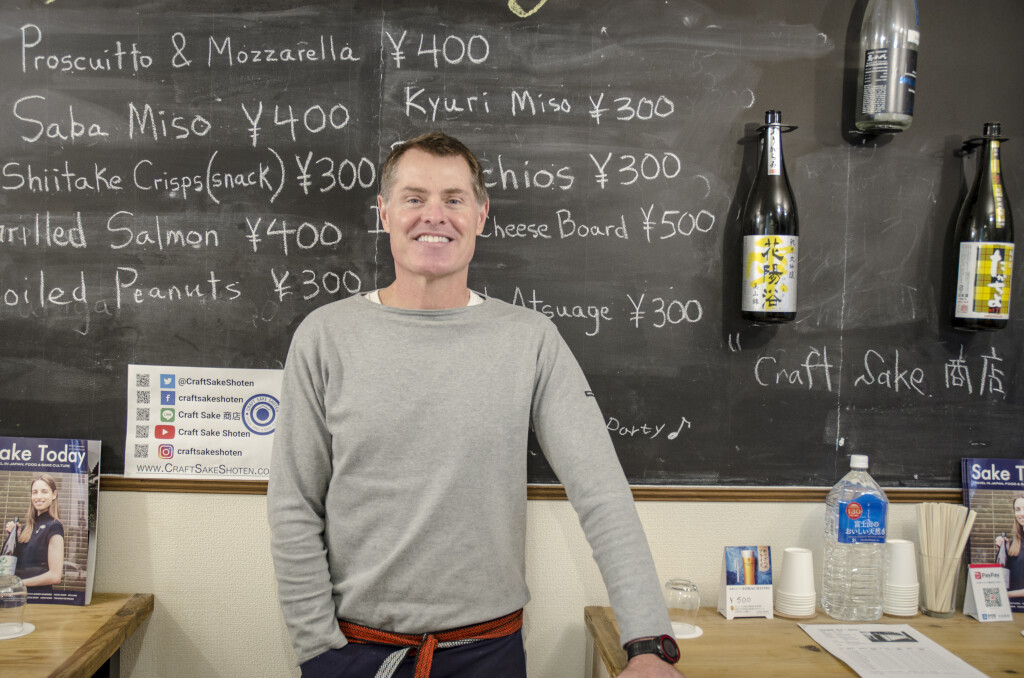Japan is full of international residents with interesting stories about how they got here and what they’re doing now. It always seems to involve unexpected twists and fortuitous encounters. One of those residents is Yokohama’s Brian Hutto.
Hutto is the owner of Craft Sake Shoten, a casual sake-tasting room a few blocks from Yokohama Station. A little more than five years ago, Hutto was working in San Francisco in the hotel industry with no plans of moving to Japan. How do you go from there to being one of the few international residents in all of Japan to run a sake bar? Again, unexpected twists and fortuitous encounters.
“My age had a lot to do with it,” says Hutto, who is now 56. “Maybe it was a little bit of a mid-life crisis. I came to Japan for the first time in 2010 for a business trip and a few times after that for pleasure. I enjoyed Japan–the culture–and I thought that my personality and values fit Japan. I wanted to make a change in my life. The clock was ticking, my health was good, and I had an adventurous spirit. I realized if I wanted to make a move, I’d have to do it soon.”
He didn’t speak Japanese, though, and wasn’t interested in becoming an English teacher so he looked into launching a business–that would also provide a business investor visa. As he lived in California and liked wine, his original idea was a wine import company. In 2015, he searched online for a business consultant in Japan that could help him set up his new dream and that’s when fate stepped in.
The Kamakura-based consultant who got him established was involved in sake on the side and suggested he also consider exporting sake back to America. The day Hutto arrived in Japan in 2016 to start on his new path, that consultant invited him out for dinner.
“He told me he was bringing along his sake sensei. I was jet-lagged but he strong-armed me into coming along. I didn’t know who this person was at the time, or his standing in the sake industry, but that person was John Gauntner.”
Gauntner is generally considered the world’s foremost non-Japanese expert on sake, though he is quite respected among Japanese in the sake industry, too. He runs certification programs and has published several books. Hutto’s consultant also soon introduced him to another deeply connected individual from Niigata who produces labels for many breweries in the sake industry.
“I can’t really pinpoint an epiphany moment,” says Hutto. “But I talked to John and right around this time I attended a sake-related event in Tokyo. I made some really good contacts and started considering focusing on sake, not wine. I also quickly discovered that the wine market was more saturated than I had realized.”
As a condition of setting up his business in Japan, Hutto needed a physical address. He settled on a multi-use space, figuring he might need to pour samples of wine for restaurant owners. That space would become his sake bar.
Hutto’s contact from Niigata introduced him to Meishu Center in Tokyo, suggesting that he set up a Yokohama branch of this popular sake tasting bar. The owner works with over forty sake producers and agreed to supply Hutto with sake.
“The ownership of our two retail shops was separate, but she gets good discounts and exclusive products. She was able to tell her suppliers that she was exposing their sake to more people in the Yokohama market. It was an easy way for me to get started.”
Hutto finally opened his doors in 2017. He had hung a sign outside for several months that featured his face and people were intrigued–a foreigner running a sake bar? Hutto admits that in the early days many came in to practice their English. Eventually, he built a core community of fans.
As Hutto’s knowledge grew and his palate became more sophisticated, he started bringing in his own selections, rather than what Meishu Center gave him. His Niigata connection, meanwhile, was able to get Hutto rare bottles from his own brewery visits. Serious sake fans began to come as well.
This past summer, Hutto finally decided to go independent from Meishu Center and stock all his inventory himself. He rebranded his shop Craft Sake Shoten.
Prior to the pandemic, tourism in Japan was surging and Hutto notes that he was getting business from Airbnb customers signing up for “experiences”–namely, his two-hour sake tasting seminar before opening hours. Post-pandemic, though, he’s been doing well enough with regulars and sake aficionados.
“These days, customer numbers are off, but revenue is holding its own. People stay longer and drink more.”
Having visited several times ourselves, we understand why. Congratulations, Hutto, on a dream come true!


